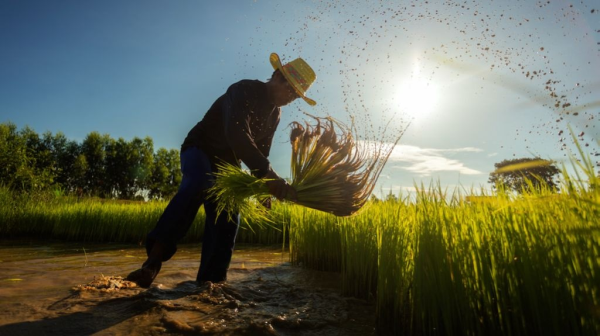KPL
(KPL) The Asian Development Bank (ADB) on Sep 27 announced plans to provide at least US$14 billion over 2022–2025 in a comprehensive program of support to ease a worsening food crisis in Asia and the Pacific, and improve long-term food security by strengthening food systems against the impacts of climate change and biodiversity loss.

Photo by ADB
(KPL) The Asian Development Bank (ADB) on Sep 27 announced plans to provide at least US$14 billion over 2022–2025 in a comprehensive program of support to ease a worsening food crisis in Asia and the Pacific, and improve long-term food security by strengthening food systems against the impacts of climate change and biodiversity loss.
The assistance expands ADB’s already significant support for food security in the region, where nearly 1.1 billion people lack healthy diets due to poverty and food prices which have soared to record highs this year. The funding will be channeled through existing and new projects in sectors including farm inputs, food production and distribution, social protection, irrigation, and water resources management, as well as projects leveraging nature-based solutions. ADB will continue to invest in other activities which contribute to food security such as energy transition, transport, access to rural finance, environmental management, health, and education.
“This is a timely and urgently needed response to a crisis that is leaving too many poor families in Asia hungry and in deeper poverty,” said ADB President Masatsugu Asakawa, in remarks at ADB’s 55th Annual Meeting. “We need to act now, before the impacts of climate change worsen and further erode the region’s hard-won development gains. Our support will be targeted, integrated, and impactful to help vulnerable people, particularly vulnerable women, in the near-term, while bolstering food systems to reduce the impact of emerging and future food security risks.”
The Russian invasion of Ukraine has disrupted supplies of food staples and fertilizer, straining a global food system already weakened by climate change impacts, pandemic-related supply shocks, and unsustainable farming practices.
Asia and the Pacific is vulnerable to food shocks, as some of its countries depend on imported staples and fertilizer. Even before the invasion of Ukraine, nutritious food was unaffordable for significant portions of the population in many ADB low-income member countries.
As well as supporting vulnerable people, ADB’s food security assistance will promote open trade, improve smallholder farm production and livelihoods, ease shortages of fertilizer and promote its efficient use or organic alternatives, support investments in food production and distribution, enhance nutrition, and boost climate resilience through integrated and nature-based solutions. A key focus will be to protect the region’s natural environment from climate change impacts and biodiversity loss, which have degraded soils, freshwater, and marine ecosystems.
“An important part of our long-term approach is to safeguard natural resources and support farmers and agribusinesses which produce and distribute much of the region’s food, and to promote open trade to ensure it reaches consumers efficiently,” said Mr. Asakawa.
Assistance under the programme will start this year and continue through 2025. It will be drawn from across ADB’s sovereign and private sector operations, and seek to leverage an additional US$5 billion in private sector cofinancing for food security.
ADB will apply lessons learned from supporting its members during the global food crisis in 2007–2008 and through the implementation of its food security operational plan the following year. Since then, ADB has provided US$2 billion in annual investments in food security. In 2018, ADB identified food security as a key operational priority.
ADB is committed to achieving a prosperous, inclusive, resilient, and sustainable Asia and the Pacific, while sustaining its efforts to eradicate extreme poverty. Established in 1966, it is owned by 68 members—49 from the region.
KPL